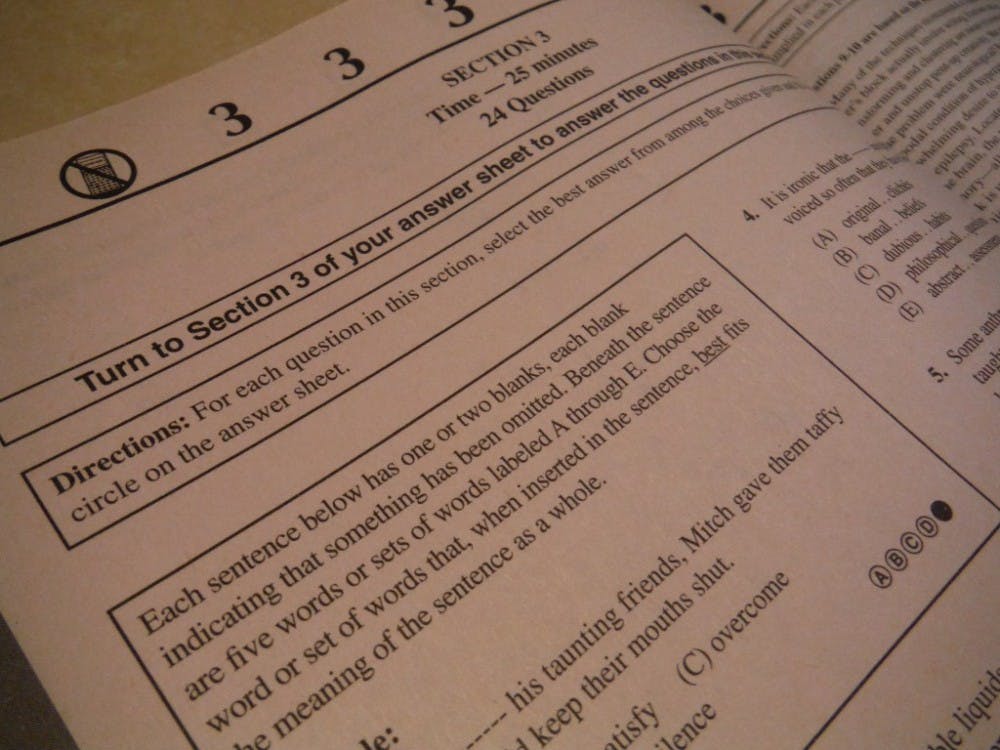In an effort to impose a fair national test-taking standard, the SAT will drop the required timed essay, eliminate the more obscure vocabulary questions and return to the 1600-point scale. Though Elon University has in the past embraced the addition of the 800-point writing section, the university follows the guidelines of the College Board when it comes to standardized testing.
Another major change is the end of the 1/4 point penalty for a wrong answer that punished would-be guessers.
This redesign is the SAT’s second since 2000, and it won’t take effect until the 2016 testing season. But critics of the change are up-in-arms now, saying the new test is a shift away from emphasizing writing in secondary education, which then translates to deficiencies at the college level.
“It’s academically concerning,” said Elon University Registrar Rodney Parks. “Students need to be learning the broad skills — writing, researching and reading with depth — early on, so that they can come into college and apply them right away. Filling in bubbles doesn’t accomplish that goal.”
Even before the changes were announced, some schools have already gone SAT-optional, Wake Forest University among them. But according to Greg Zaiser, vice president of admissions and financial planning, Elon isn't taking that step just yet.
"The SAT has been significant in Elon’s rise to national prominence and, at this early juncture, I don’t foresee us foregoing it for admission in the future," Zaiser said.
The formerly-required timed essay, which debuted on this century’s first revamp of the SAT a decade ago, doesn’t provide a complete and telling portrait of a student’s ability to write, according to Megan Isaac, chair of the English department and associate professor.
Some students write better under pressure, she said, while others require a more traditional process of crafting an essay from a series of edited drafts, which the time constraints of the SAT don’t allow for.
“I think the decision to make the SAT essay optional reflects an understanding that the kind of writing generated under the pressures of the exam tells very little about the writing potential of a student,” Isaac said.
Last year, the ACT — the other widely-taken national standardized college-readiness test that has a science section and no essay - for the first time surpassed the SAT in the number of people taking it nationally. SAT skeptics have said the test is simply copying tried and true ACT testing standards.
ACT President Jon Erickson told the Washington Post he was glad with the College Board’s announcement, but that it was long overdue.
“I appreciate and I’m glad they’re fixing their acknowledged flaws in their test,” Erickson said.
College Board President David Coleman said in a speech in Austin, Texas last week that the SAT overhaul was not in response to any competition from the ACT, but rather indicative of the need to extend higher education opportunities to more students.
“What this country needs is not more tests, but more opportunities,” Coleman said. “The real news today is not just the redesigned SAT, but the College Board’s renewed commitment to delivering opportunity.”
His speech last week came on the heels of the release of the 2013 SAT results toward the end of last year, which found a staggering 43 percent of students taking the test not ready for college. Each year, the SAT decides a “benchmark college readiness” score that is supposed to measure a student’s ability to perform academically at the collegiate level.
And that number has remained “virtually unchanged” over the last five years, according to the College Board, which no doubt encouraged the redesign.
To these discouraging numbers, pundits have pointed to classrooms they say prize teaching to the test more so than actually
preparing students for the next step: college. And they say it applies to both public and private schools, though private schools tend to have more control over the curriculum on the level of the individual school.
But the 45-minute timed essay portion might have been discouraging creativity just as much as the rest of the test, according to Drew Perry, associate professor of English.
“I’ve never been convinced that a timed essay scored not for beauty but for alleged effectiveness is an accurate measure of ability,” Perry said.
Jessie Moore, associate professor of English, said she sees in her English 101 classes a tendency to write in a particular fashion, one that aligns itself closely with the “formulaic” five-paragraph template that sandwiches three body paragraphs between an introduction and a conclusion.
“Our students here at Elon tend to be very well prepared, but even here students have been prepared to write on one type of writing, rather than learning broad strategies to write across any curriculum, any subject matter,” she said.
To increase the ability of students to prepare for the SAT, the College Board also announced last week a partnership with the Khan Academy to provide affordable online preparatory work to all would-be test-takers.
The partnership, criticized by the pro-ACT camp for not doing enough to prepare students, should serve as a complement to the existing preparatory system brought to students from the school system, nationally.
“Our school systems are not preparing our students as well as they could for writing because of the state-mandated testing and curriculums, but I think that they’re doing as well as they can within the limitations that they have,” Moore said.


